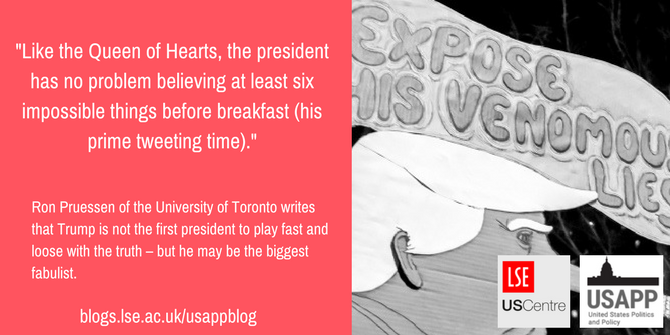 The term “trumped up” has become ironically relevant to the behavior of the 45th US president, as evidence of brazen dishonesty continues to mount. Ron Pruessen considers how Donald Trump has utilized a mold inherited from predecessors – and how he is on the way to spectacularly breaking it.
The term “trumped up” has become ironically relevant to the behavior of the 45th US president, as evidence of brazen dishonesty continues to mount. Ron Pruessen considers how Donald Trump has utilized a mold inherited from predecessors – and how he is on the way to spectacularly breaking it.
“Lord, Lord, how the world is given to lying”: so says Falstaff in Henry IV: Part One. Almost half a millennium later, Donald Trump is offering a master class that Shakespeare’s corpulent and confabulating knight might appreciate. (Iago too, for that matter.)
Not that the 45th president is charting a totally unique course. Prevarication, mendacity, obfuscation, and flimflam have always been at home in the United States, not least in its political arenas. In 1800, Thomas Jefferson bemoaned being “surrounded by enemies and spies catching and perverting every word which falls from my lips or flows from my pen, and inventing where facts fail them.” Samuel Clemens would also have recognized the problem, though his Mark Twain persona would have sometimes chuckled about it: one 19th century public figure of his acquaintance, he wrote, was “an experienced, industrious, ambitious, and often quite picturesque liar.” These are not traits or traditions celebrated in July 4 orations, but their bloodlines run deep and strong.
Jimmy Carter said “I will never lie to you” as he sought to chart a route away from the Watergate swamp – but Richard Nixon’s free-wheeling approach to “truth” was far more typical of White House history. Dwight Eisenhower’s attraction to covert operations (think Iran, Guatemala, Eastern Europe, and Indonesia in the 1950s) was driven in substantial part by a desire for “plausible deniability.” “Implausible” quickly became the more appropriate adjective, however. Lyndon Johnson felt the burn as doubts arose about the spurious grounding of the Gulf of Tonkin resolution – as did Henry Kissinger and Nixon when dirty deeds became evident in Chile and Cambodia. Observers saw the darkness that figured in Ronald Reagan’s “morning in America” as the Iran-Contra scandal unfolded and Bill Clinton’s experience showed how duplicity could be used (unsuccessfully here too) to deal with personal as well as political conduct.
If Trump has White House antecedents, however, he would nonetheless be happy to know that this is one area in which he actually is doing more than all others: he is the veritable Paul Bunyan of presidential liars, a fabulist without parallel in the Oval Office – even if we have had less than one year to tote up his tall tales.
Trump has been nothing if not audacious in his charlatanry – truly (if that word can be used here) consummate as a liar. From the early days of Obama birth certificate humbug to the long and still growing 2017 playlist: his predecessor’s “wiretapping” of Trump Tower (microwaves included), an Electoral College victory bigger than any since Reagan, the contentions that no one cares about his tax returns or that the media ignores many acts of terrorism, his winning of the women’s vote, the recanting of the “locker room” dialogue with Billy Bush on the infamous Access Hollywood tape, ad infinitum: it has grown impossible to keep count as tweets and taunts flow from what we can now recognize as the White House font of fake news.

“Trump Pinocchio” by Meshae Studios is licensed under CC BY 2.0
One source of Trump’s energy as a fabulist is his capacity to be a true believer, his inability to resist imbibing his own Koolaid. He is rarely bothered by the fact that facts can easily be checked – as in photographs of the inaugural crowd or the superior Electoral College performance of George H.W. Bush, Bill Clinton, and Barack Obama. Like the Queen of Hearts, the president has no problem believing at least six impossible things before breakfast (his prime tweeting time). His narcissistic yearning for recognition as the all-time alpha of the Oval Office is so extreme as to be pathological. He desperately needed the inauguration crowd to be bigger, he yearns to have more Time covers than any of his predecessors, etc. – and it ultimately doesn’t matter to him if the real world does not confirm how he would have been allowed to see things during his days in “reality TV.”
There is a shrewd Machiavellian reinforcement for the pathology, of course – the familiar ploy of “distraction.” Dominate the conversation by feeding extremist meat to the media and the electorate: it may be tainted and even poisonous, but it’s hard to ignore. If it works, it means that kneeling football players, Al Franken, and Elizabeth (“Pocahontas”) Warren will get more attention than dubious judicial appointments, the Russian ties of family and friends, the travails of Puerto Rico, or the mad dash to pass a tax bill before there’s a chance for traditional hearings and studies to examine the tricks and tripe machinations of the Congressional sausage factory.
The distraction strategy may become less effective over time. Congress could either increasingly realize the political foolhardiness of aiding and abetting Trump’s bunkum – especially if the 2018 elections become a smack across the face for some Republican offenders. The media may also keep accumulating the fruits of investigative journalism. Complemented by the efforts of Special Prosecutor Robert Mueller, Trump’s credibility may be increasingly eroded – or he might even confront serious legal challenges that the snapping lapdog currently parading as Attorney General continues to resist. And average citizens could help turn the tide, as well (aided by the fact that Trump didn’t actually win the popular vote in the first place). There could be another demonstration of “honest Abe” Lincoln’s contention that “You can fool all the people some of the time, and some of the people all the time, but you cannot fool all the people all the time.” (Or, as Machiavelli put it long before, “people are fickle by nature: it is easy to convince them of something, but difficult to hold them in that conviction.”
Any measure of hope, of course, would seem to rely exclusively on the evolution of the environment around the 45th president – since the pathological liar at the center of the arena shows no signs of changing. That means we will all need to keep taking deep breaths and resorting to antacids or ale – bourbon or burgundy? – to help us get through the bizarre and frightening Age of Trump. As writers from Aesop to George Orwell to Italo Calvino have shown, fabulist fiction can be wonderful and thought-provoking. A fabulist fabricator in the White House: not so much.
Please read our comments policy before commenting.
Note: This article gives the views of the author, and not the position of USAPP – American Politics and Policy, nor of the London School of Economics.
Shortened URL for this post: http://bit.ly/2iTrgE6
_________________________________________
About the author
 Ron Pruessen – University of Toronto
Ron Pruessen – University of Toronto
Ronald W. Pruessen has served as the Munk School of Global Affairs’ Director for International Partnerships & Research and is former Chair of the Department of History, University of Toronto. His primary research and teaching interests are in 20th century US foreign policy and international relations. Early work focused on the Cold War (e.g., John Foster Dulles: To the Threshold, 1888-1952) and he recently co-edited (with Soraya Castro) Fifty Years of Revolution: Perspectives on Cuba, the United States, and the World. He is currently writing a study of the way Barack Obama’s foreign policies relate to deeply rooted American views and behavior.






